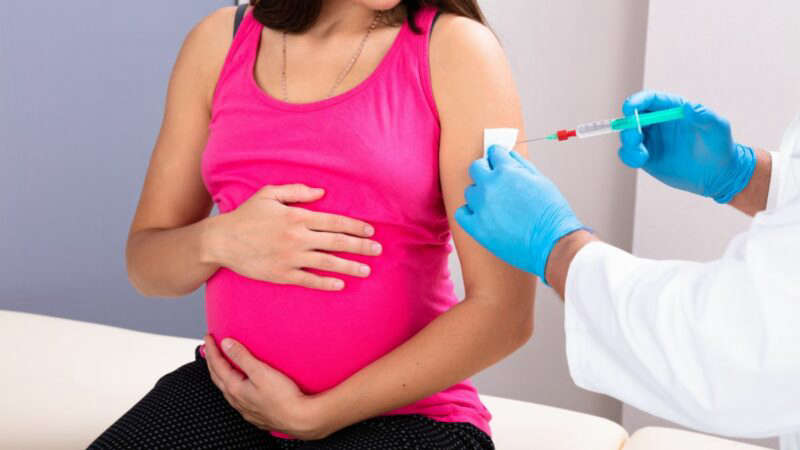
In a bid to protect the health of expectant mothers and their unborn children, the NHS is reminding people of the importance of whooping cough vaccination during pregnancy.
Whooping cough (pertussis) rates have risen sharply in recent years and babies who are too young to start their vaccinations are at the greatest risk.
What is whooping cough?
Whooping cough is characterised by uncontrollable, violent coughing fits.
It poses a significant risk to newborns, who are particularly vulnerable to its effects, often leading to hospitalisation and, in severe cases, even death.
How to protect your baby
Vaccination remains the most effective means of prevention against this disease.
Pregnant women can help protect their babies by getting vaccinated – ideally from 16 weeks up to 32 weeks pregnant.
If for any reason you miss having the vaccine, you can still have it up until you go into labour.
By receiving the vaccine during pregnancy, mothers pass on protective antibodies to their unborn babies, offering them crucial immunity during the vulnerable first few weeks of life when they are too young to receive the vaccine themselves.
The NHS guidelines align with recommendations from the World Health Organization (WHO) and other global health authorities, which advocate for routine whooping cough vaccination during pregnancy as part of a comprehensive strategy to control the spread of the disease.
Pertussis-containing vaccine (whooping cough vaccine) has been used routinely in pregnant women in the UK since October 2012, and the Medicines and Healthcare Products Regulatory Agency (MHRA) is carefully monitoring its safety.
What the experts say
Dr Sarah Johnson, a leading obstetrician and spokesperson for the NHS, emphasised the importance of this preventive measure.
She said: “Whooping cough can be a serious illness, particularly for young infants.
“By vaccinating expectant mothers, we can help protect both mothers and their babies from this potentially dangerous infection.
“Extensive research and real-world data have demonstrated that the whooping cough vaccine is safe for both expectant mothers and their babies.
“The benefits of vaccination far outweigh any potential risks.”
Professor David Patel, a specialist in infectious diseases, commended the initiative.
He said: “Vaccination during pregnancy is a highly effective strategy for preventing whooping cough in newborns.
“These updated guidelines will undoubtedly contribute to improved maternal and infant health outcomes.”
Raising awareness
The NHS is also working to raise awareness among healthcare providers about the importance of offering the whooping cough vaccine to pregnant women during routine prenatal care visits.
This proactive approach aims to ensure widespread access to vaccination and maximise protection for mothers and their infants.
Public health experts welcome the NHS guidelines, viewing them as a positive step toward reducing the burden of whooping cough and safeguarding the health of vulnerable people.
By increasing awareness of the vaccination, the NHS aims to mitigate the impact of whooping cough and ensure a healthier start for newborns across the country.
What can you do?
Speak to your midwife to get your whooping cough vaccination. For further information about vaccinations in pregnancy, see www.nhs.uk/pregnancy/keeping-well/vaccinations

 County Council welcomes major step on SEND funding while highlighting wider pressures on local services
County Council welcomes major step on SEND funding while highlighting wider pressures on local services
 Council warns Government funding settlement leaves local taxpayers carrying the load
Council warns Government funding settlement leaves local taxpayers carrying the load
 Your body, your choice – Devon Sexual Health launches new website
Your body, your choice – Devon Sexual Health launches new website
 Views sought on proposals for new Local Government arrangements for Devon
Views sought on proposals for new Local Government arrangements for Devon











